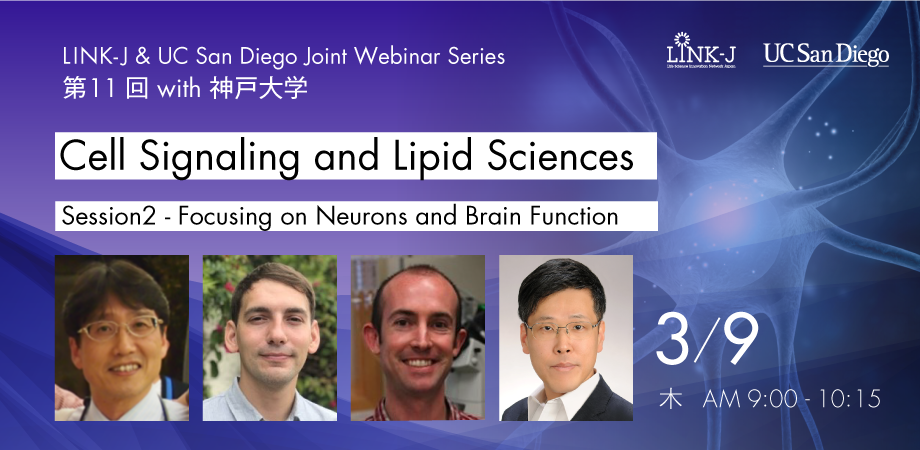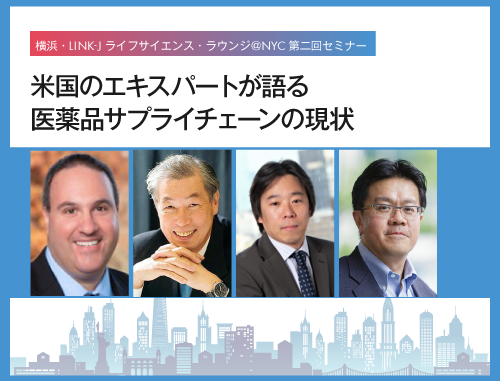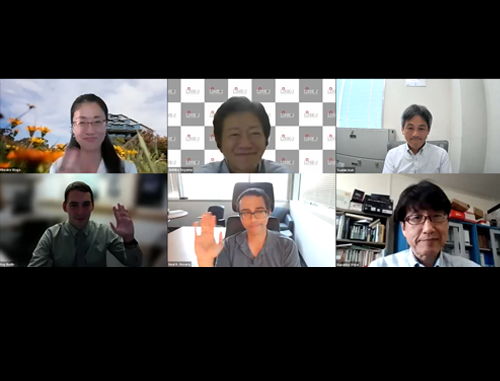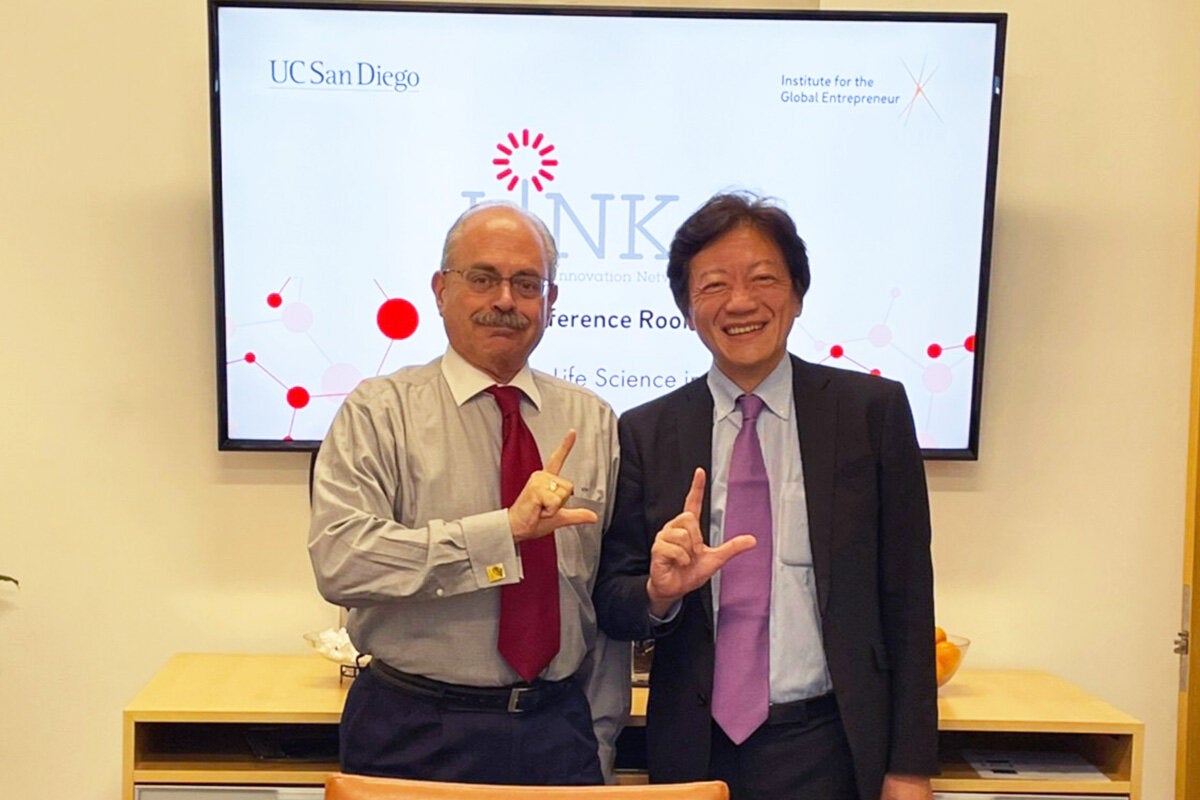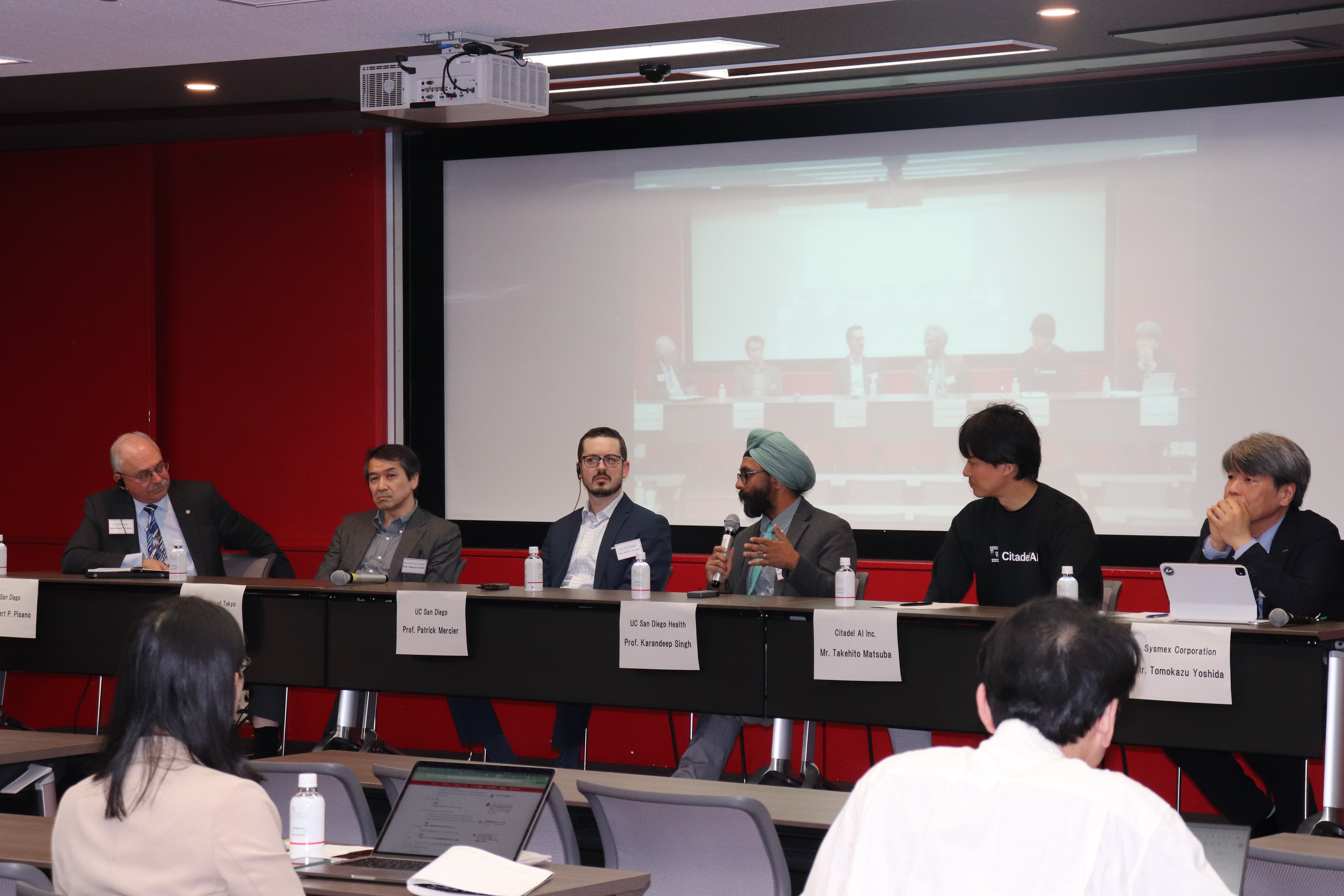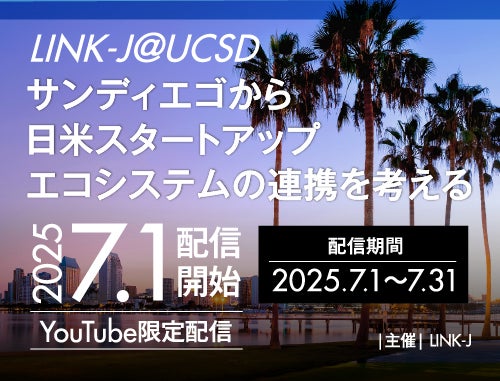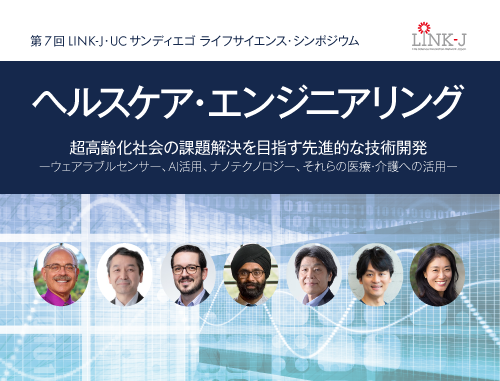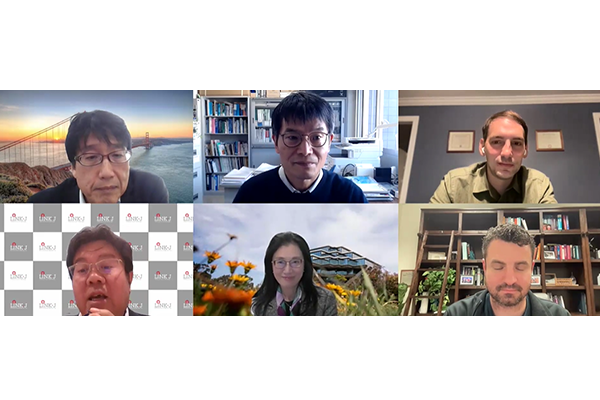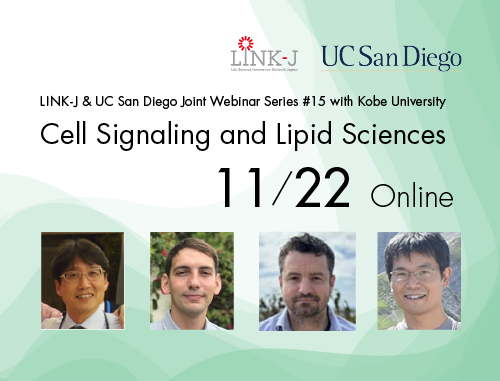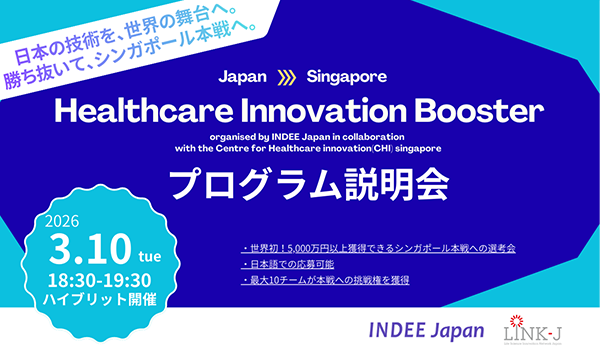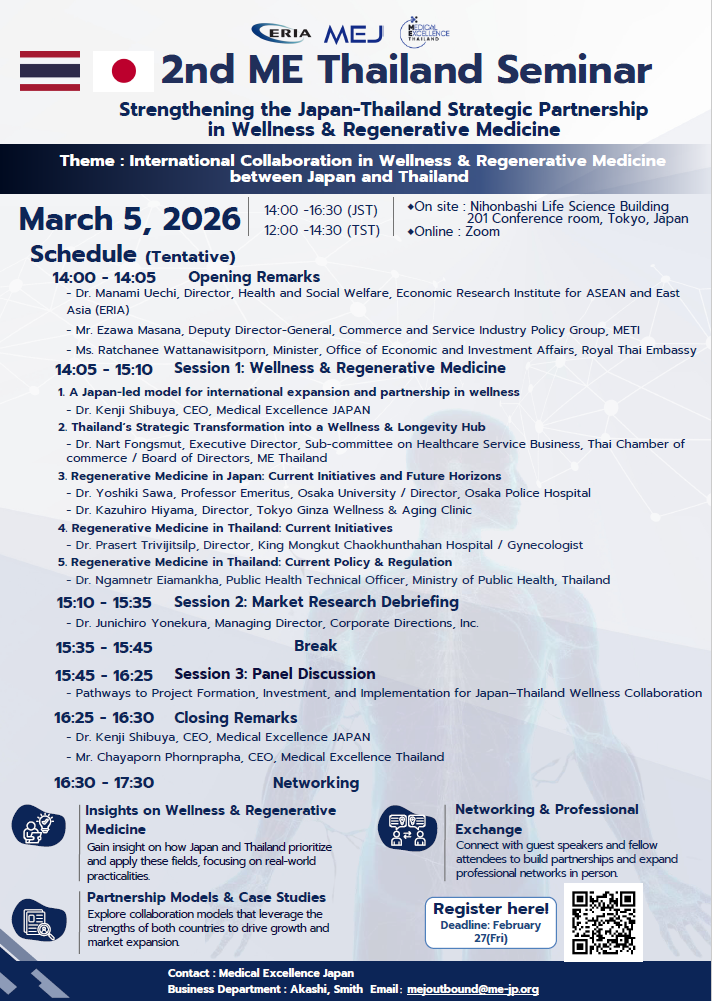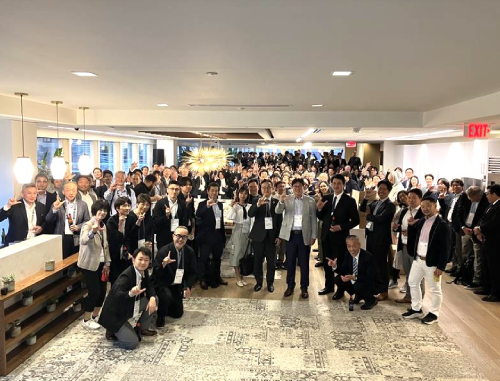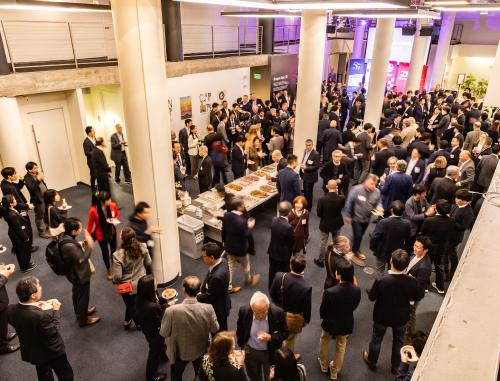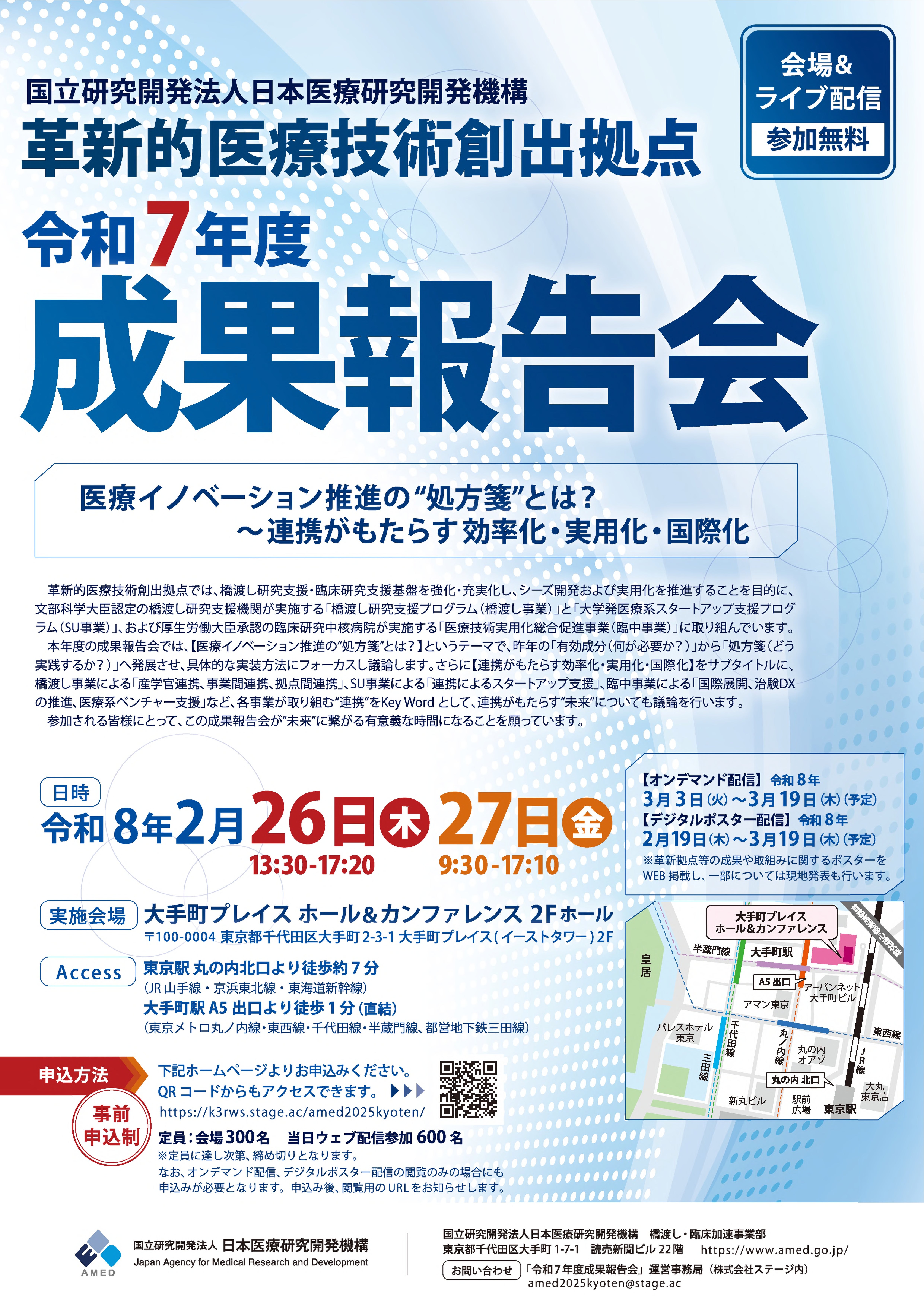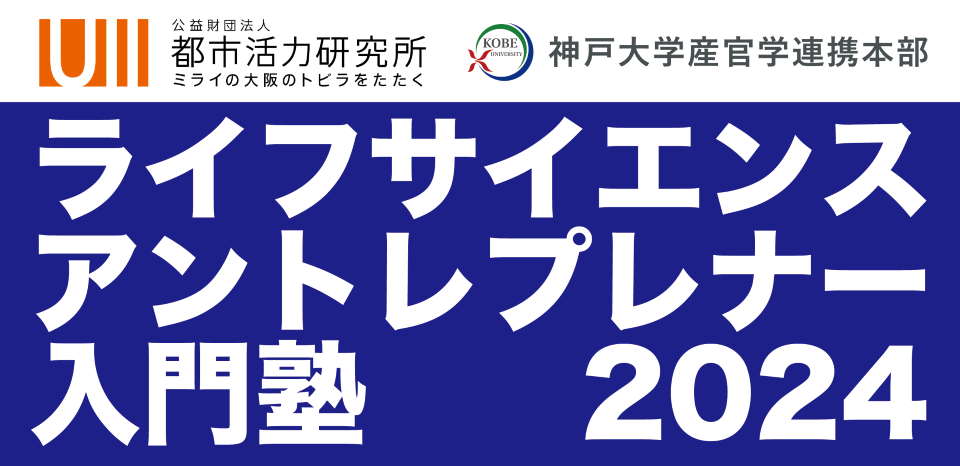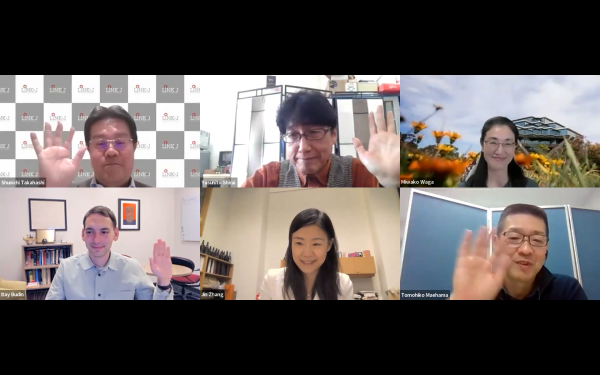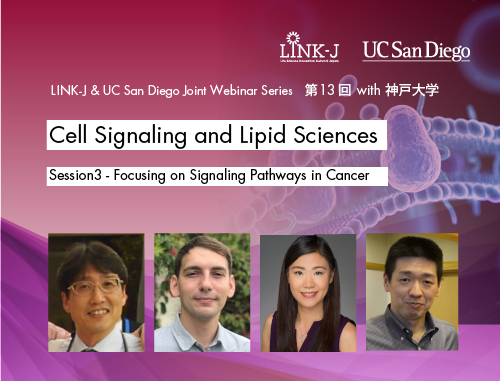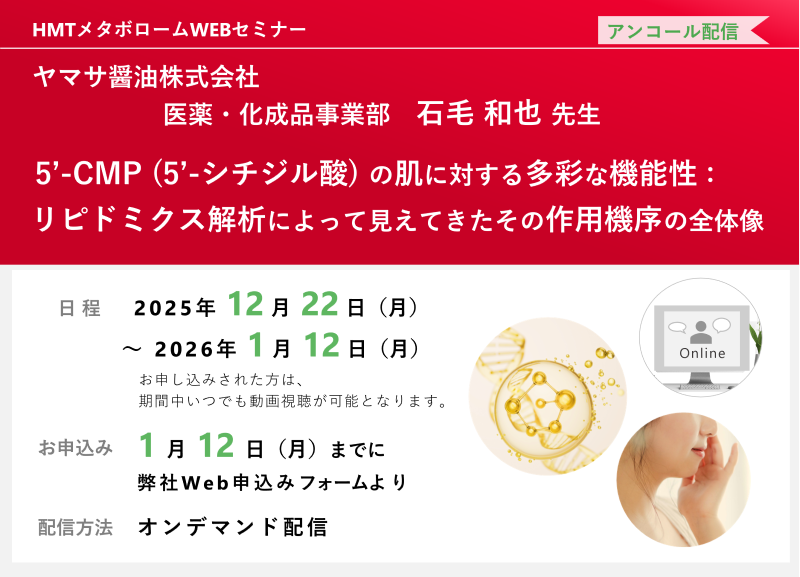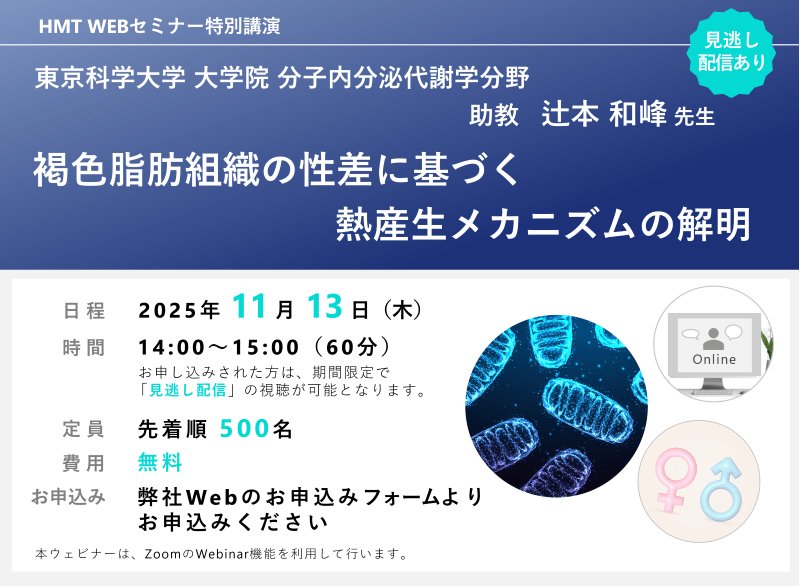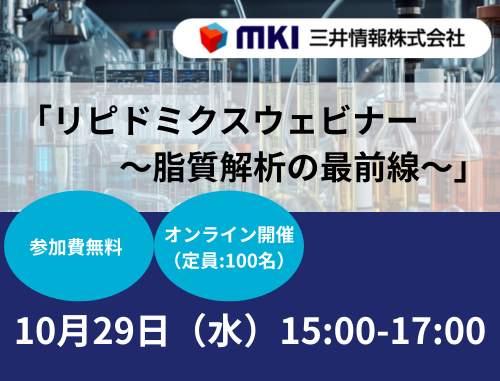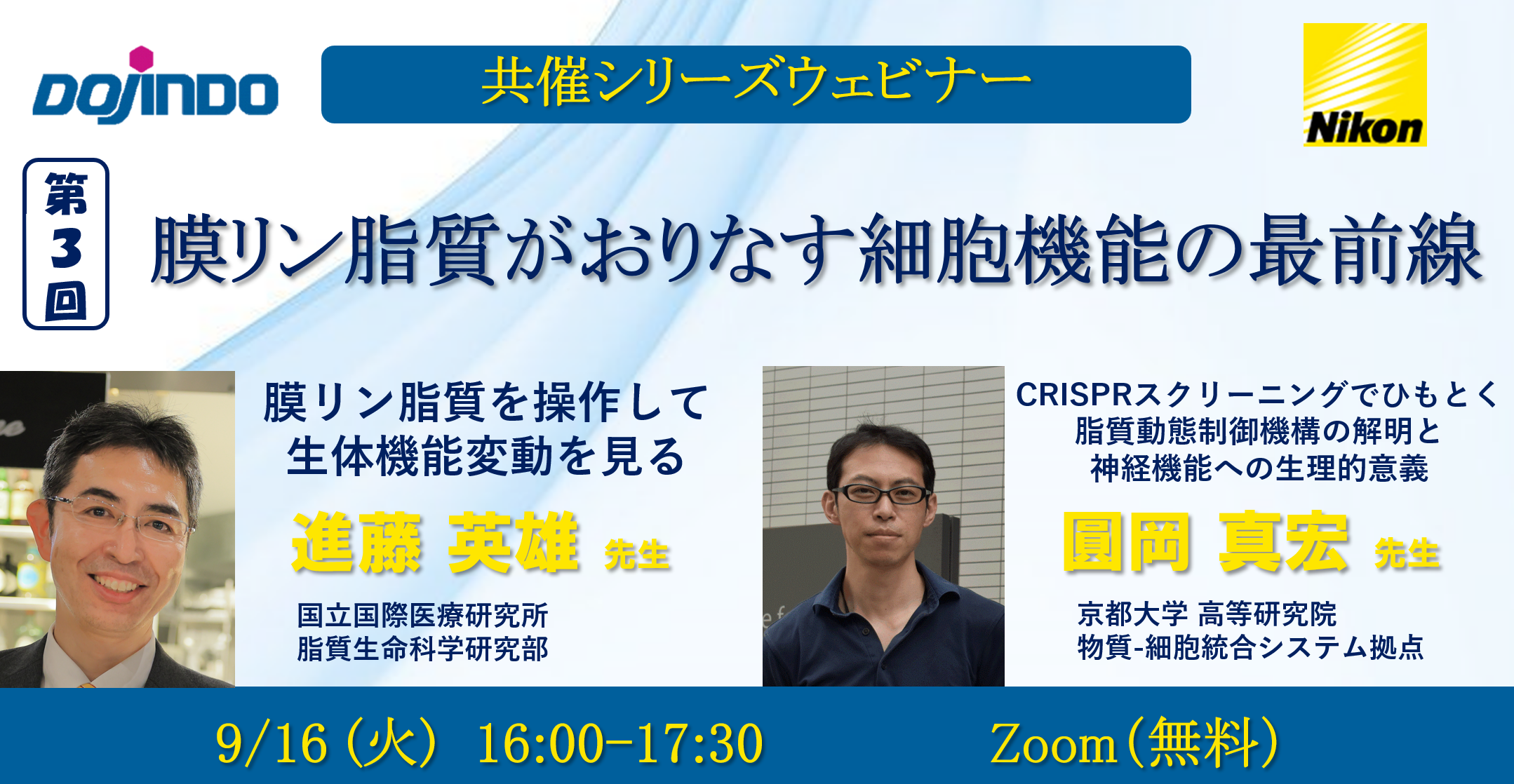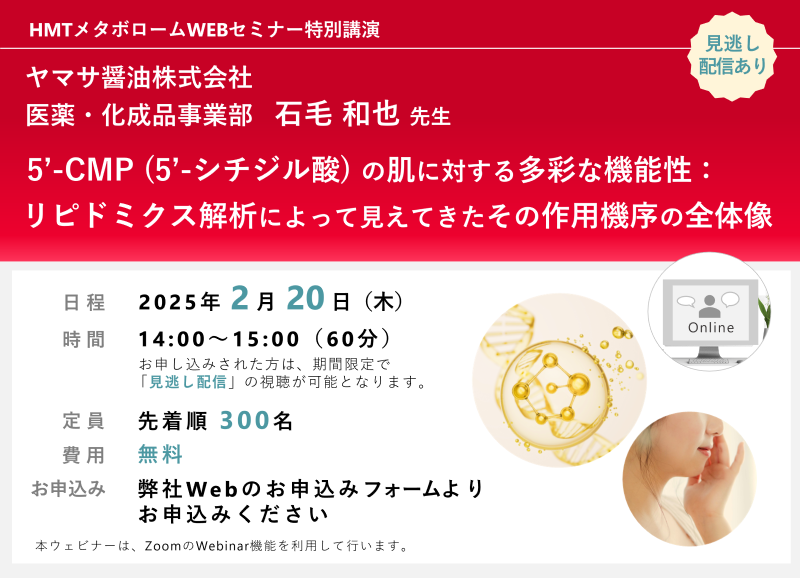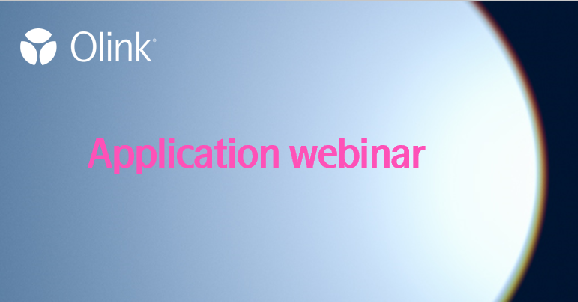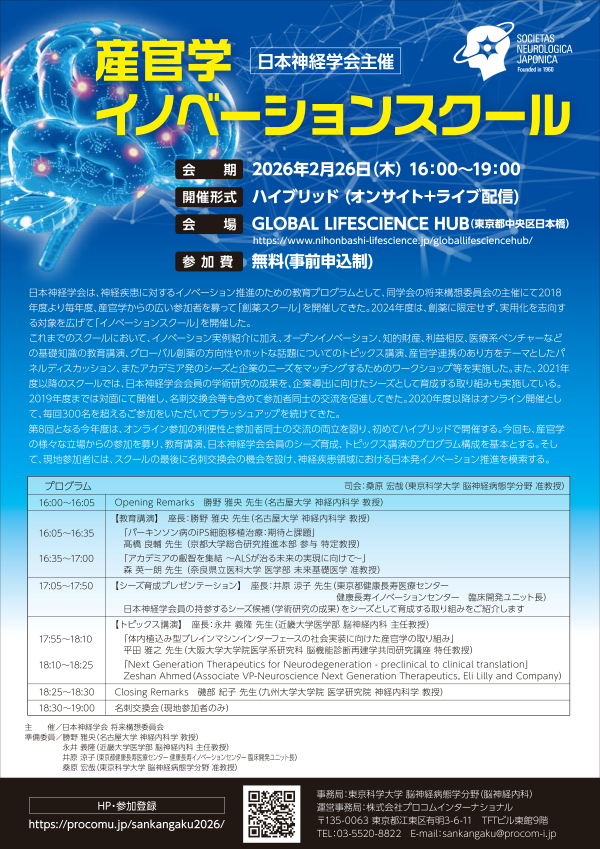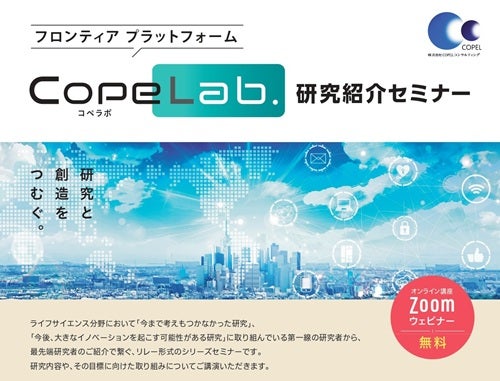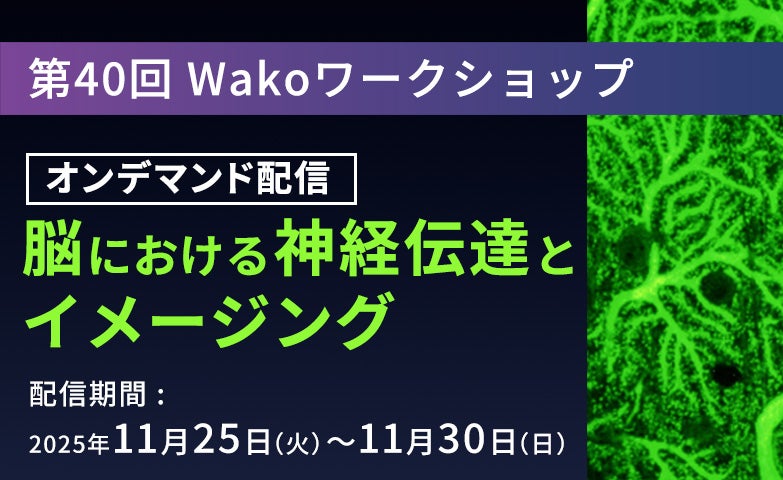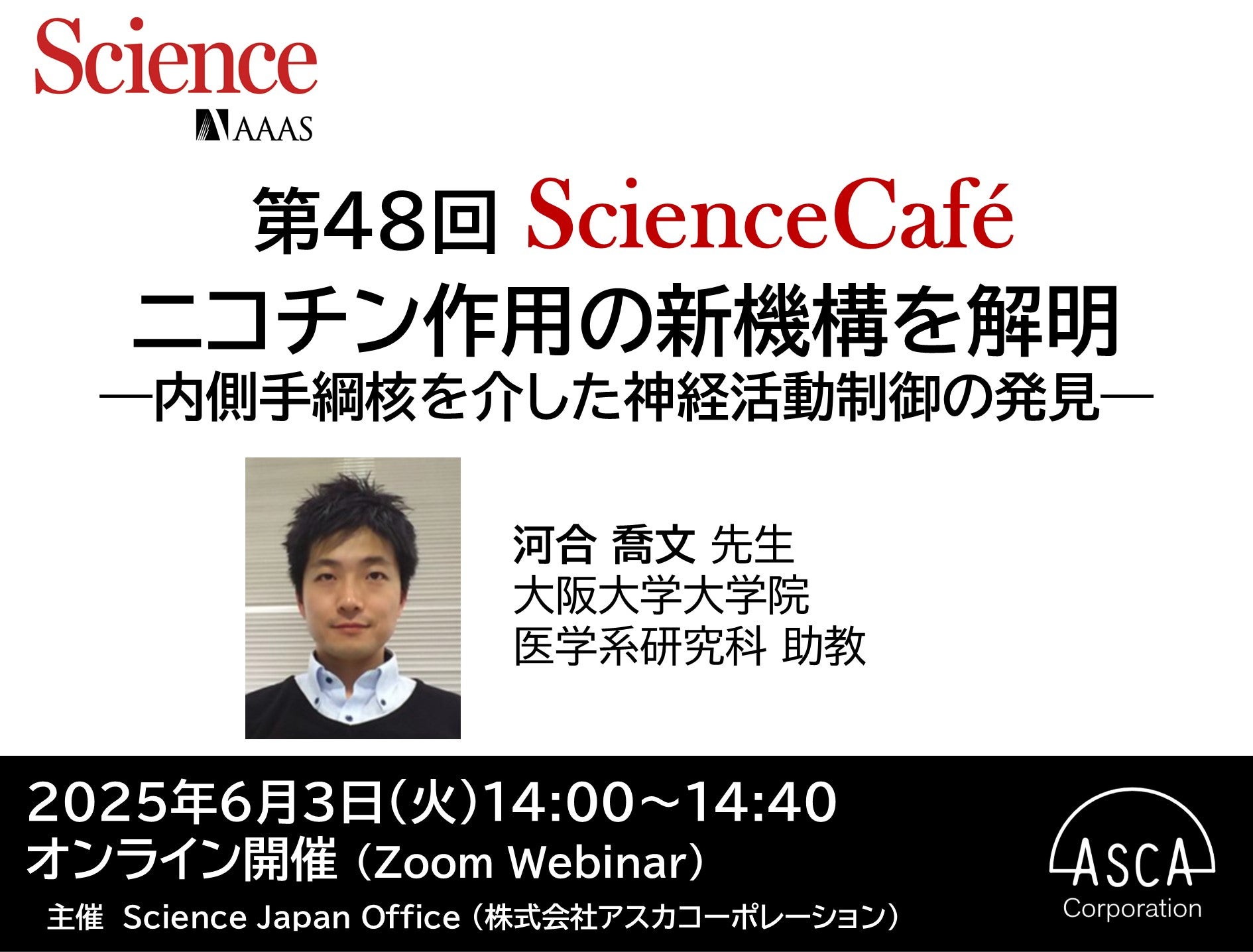LINK-J & UCサンディエゴ ジョイントウェビナーシリーズ 第11回 with 神戸大学
UCサンディエゴと神戸大学は何年にもわたり生命科学、計算機科学、構造工学の分野で共同研究を進めてきました。特に両校が強みを持つ生物学、生化学における脂質研究は、双方の研究者が重点的に協力してきた分野です。今回2回目となる「細胞内シグナル伝達と脂質研究」ジョイントウェビナーシリーズでは、UCサンディエゴのセルシグナリングセンターと神戸大学のバイオシグナル総合研究センター及びメディカルトランスフォーメーション研究センターの研究者が最新の研究成果をご紹介します。細胞質膜の脂質組成やタンパク質との相互作用は、細胞の移動だけでなく、細胞分化やアポトーシスにも密接に関連しています。また、脂質やその代謝物は脳の構造や機能に重要であり、神経疾患にも関与しています。実際に、脳は脂肪組織についで高濃度の脂質を有してます。本セッションでは、両校の教授が膜における神経伝達物質受容体の構造や脳高次に機能における脂質関連酵素及び脂質代謝物の役割について論じます。
使用言語:英語
※同時通訳あり
※英語字幕利用可能(オン/オフは自由に選択できます)
※字幕は市販されているアプリを使用しており、LINK-JおよびUC San Diego、神戸大学は誤訳、訳文の欠落など、字幕に関する一切の責任は負えませんので、ご了解願います
字幕利用方法:クローズドキャプションの管理と表示
◆前回までのUCサンディエゴに関するイベントやレポートはこちらをご覧ください
プログラム
| Japan Time | Pacific Time | Agenda |
| 9:00-9:02 | 4:00-4:02 | Welcome - Akihiko Soyama, LINK-J and Miwako Waga, UC San Diego |
| 9:02-9:03 | 4:02-4:03 | Brief Remarks - Dr. Yasuhito Shirai, Professor, Graduate School of Agricultural Science, Kobe University |
| 9:03-9:05 | 4:03-4:05 | Brief Remarks and Speaker Introduction - Dr. Itay Budin, Assistant Professor of Chemistry and Biochemistry, UC San Diego |
| 9:05-9:30 | 4:05-4:30 | Presentation - "Nicotinic acetylcholine receptor structural pharmacology and gating transitions" Dr. Ryan Hibbs, Professor of Neurobiology, UC San Diego School of Biological Sciences |
| 9:30-9:34 | 4:30-4:34 | Q&A - moderated by Dr. Budin |
| 9:34-9:35 | 4:34-4:35 | Speaker introduction - Dr. Shirai |
| 9:35-10:00 | 4:35-5:00 | Presentation - "Inflammatory mechanisms of stress and depression" Dr. Tomoyuki Furuyashiki, Professor of Pharmacology, Kobe University Graduate School of Medicine |
| 10:00-10:14 | 5:00-5:14 | Q&A and Discussion - moderated by Drs. Shirai & Budin |
| 10:14-10:15 | 5:14-5:15 | Closing Remarks - A. Soyama |
※若干延長する可能性がございます。
アブストラクト
Dr. Hibbs's talk
"Nicotinic acetylcholine receptor structural pharmacology and gating transitions"
Our lab focuses on using structural and functional approaches to understand signaling by ligand-gated ion channels in the nervous system. A major emphasis is on understanding nicotinic receptor pharmacology from a structural perspective. Here I will present some of our recent work using the muscle-type nicotinic receptor from the Torpedo ray as a structurally tractable reference for the human receptor at the neuromuscular junction. I will focus on how toxins from animals and plants, as well as drugs used in the clinic, act on the receptor, and how we can use this information to understand state transitions that underlie ion channel gating. These studies have revealed a new class of allosteric site partially buried in the lipid bilayer that small molecules important in anesthesia can leverage to cause muscle relaxation.
Dr. Fuyurashiki's talk
"Inflammatory mechanisms of stress and depression"
Stress is a strain of mental and physical functions caused by adverse and demanding conditions with internal and external factors. Stress aims to induce adaptive biological responses to promote well-being and survival. However, excessive or prolonged stress may cause mental and physical dysfunctions, increasing the risk of depression and other stress-related disorders. Studies with rodent stress models revealed that acute stress enhances stress resilience along with dendritic hypertrophy of prefrontal neurons via the dopaminergic system. In contrast, chronic stress attenuates the dopaminergic system and causes dendritic atrophy in the prefrontal cortex with microglia-driven inflammation. This inflammation is evoked via innate immune receptors TLR2/4 and exerts multiple functions via brain region-specific mechanisms with the lipid mediator PGE2 and proinflammatory cytokines. Besides, chronic stress mobilizes myeloid cells and promotes neural dysfunctions. Collectively, neural circuit remodeling driven by neural and systemic inflammation is responsible for shifting from adaptive to maladaptive responses to stress. In this presentation, I will introduce our recent findings on the inflammatory mechanisms of stress and depression and discuss their implications for therapeutic development for neuropsychiatric illnesses.
登壇者略歴
Dr. Yasuhito Shirai, Professor, Graduate School of Agricultural Science, Kobe University
Yasuhito Shirai is a Professor and Vice Dean of the Graduate School of Agricultural Science at Kobe University. He also serves as the Director of Americas Division in the Institute for Promoting International Partnership.
Shirai earned his PhD in 1994 in the Graduate School of Agricultural Science, Kobe University. He became an Assistant Professor in the Graduate School of Science and Technology and then in the Biosignal Research Center (BSRC). While he was assistant professor at BSRC, he worked as a visiting scholar at the University California San Diego in 2000-2001. He was promoted to an Associate Professor in the BSRC and obtained a second PhD degree from the School of Medicine of Kobe University in 2005. Finally, he was promoted to a Professor in the Laboratory of Chemistry and Utilization of Animal Production Resources in the Department of Agrobioscience, Graduate School of Agricultural Science. He conducts signal transduction research focusing PKC and DGK to develop functional food, medical food, and medicine.
Dr. Itay Budin, Assistant Professor of Chemistry and Biochemistry, UC San Diego
Itay Budin is an Assistant Professor in the Departments of Chemistry & Biochemistry and Bioengineering at UC San Diego. Trained as a biophysicist, his lab investigates the interplay between lipid chemistry and cell membrane function. Dr. Budin received his PhD from Harvard University and carried out postdoctoral studies as a Miller Fellow at UC Berkeley. He is the recipient of the Walter Shaw Young Investigator Award in lipid biology from the American Society for Biochemistry and Molecular Biology and early career awards from the National Science Foundation and US Department of Energy.
Dr. Ryan Hibbs, Professor of Neurobiology, UC San Diego School of Biological Sciences
Ryan Hibbs graduated from Whitman College, a small liberal arts college in Washington State, with a combined degree in Chemistry/Biochemistry. During doctoral research at the University of California San Diego, he studied ligand specificity and conformational changes in an ion channel ligand binding domain under the supervision of Dr. Palmer Taylor (Department of Pharmacology). As a post-doctoral fellow, he pursued structural and functional studies of ligand-gated ion channels in the laboratory of Dr. Eric Gouaux (HHMI/Vollum Institute). He joined the faculty in the University of Texas Southwestern Departments of Neuroscience (primary) and Biophysics (secondary) in 2012, and is to join the faculty in the Department of Neurobiology at UC San Diego School of Biological Sciences in February 2023.
Dr. Tomoyuki Furuyashiki, Professor of Pharmacology, Kobe University Graduate School of Medicine
Tomoyuki Furuyashiki is Professor and Chair of Pharmacology at the Graduate School of Medicine, Kobe University, Japan. He graduated from School of Medicine, Kyoto University, Japan in 1997 and obtained his Ph.D. degree in 2001 at the Graduate School of Medicine there in the lab of Prof. Shuh Narumiya. After an Associate Research Scientist at the Johns Hopkins University in the lab of Prof. Michela Gallagher, he became an Assistant Professor at the Graduate School of Medicine, Kyoto University in 2008 and was promoted as an Associate Professor there in 2012. Then, he has been in the current position in Kobe University since 2014. His research interests are to elucidate biological mechanisms of stress and stress-related mental illness, such as depression, and to translate these findings to therapeutic development. Most recently, he serves an executive director of the Japanese Pharmacological Society, a director of the Japanese Society of Neuropsychopharmacology, an advisor of the Japan Agency for Medical Research and Development, and a member of the Science Council of Japan. He was recognized mainly for his discovery on the role and mechanism of inflammation for stress and depression.
参加費
無料(要事前登録)
